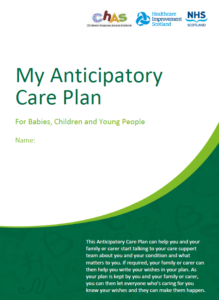Anticipatory Care Planning
Anticipatory Care Plans (ACP) are designed to help children, young people and their families think about and make choices about care for future illness and changes in health. The plan helps you think about future health, personal choices and practical arrangements. An ACP is personal and individual to each person’s wishes and needs. It gives an outline, and some sections and heading may not apply to everyone.
Planning ahead may make you feel more in control, with clearer information to share with people looking after a child or young person. It may help at worrying and difficult times.
The ACP gives preferences and choices but is voluntary and not legally binding. It should be updated when there are changes in health and personal circumstances, and when someone wishes to change their plans. It is written with guidance and discussion with healthcare professionals who know the child/young person.
Information in the ACP will be shared with consent, and can be shared with emergency and out of hours teams.
The most current Anticipatory Care Plan (ACP) for Babies, Children and Young People can be accessed here or by clicking the image below:

eKIS – the Electronic Key Information Summary.
This is a summary of critical information about a person and their most important health problems. The information is taken from the patients GP notes and is updated automatically twice daily. It can be seen by ambulance teams and NHS teams working out of hours, to make care safer and more suited to a patient in an emergency.
Remember
- health and social care professionals can advise and help you with your Anticipatory Care Plan
- it’s a good idea to take your Anticipatory Care Plan to hospital or any appointments you may have, and
- it’s your choice whether or not you want to complete an Anticipatory Care Plan.
Helping People understand a child or young person
Information about a child or young person’s choices, their likes and dislikes, and how to communicate with them can be recorded in a digital passport, such as the one designed by PAMIS.
